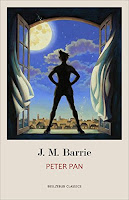 |
| (Amazon UK link) |
It was written over 100 years ago so inevitably the language is dated; that wasn’t a problem, since my granddaughter is an avid reader herself, and I was able to explain words she didn’t understand. But as I read, I became increasingly disturbed by the content.
We first meet the Darling family: two parents, living in London, with their three children: Wendy, John and Michael. Apparently Mr Darling was worried that he might not be able to afford to have children so there was a section where Mrs Darling (we never learn their first names) had to persuade him that they could keep Wendy. They don’t say what the alternative is: whether to put her up for adoption or send her into care (or the ‘workhouse’, as was a possibility in the early 20th century). But it’s a very odd concept to have in a children’s book.
Yet there are parts that obviously are intended for children, such as the required nurse (as all middle class families had in those days) being a large dog known as Nana. Nana is an excellent nurse, looking after and protecting the children, and even getting them in and out of bed. And there’s the idea of ‘Neverland’, a kind of dream place that is different for each child, which they believe in when young but gradually lose as they grow older.
But the first chapter or two focuses more on the parents than the children, and we learn of their devastation when, suddenly, all three have vanished. They don’t seem to have reported this to the police; they are heartbroken, but keep the windows open in case they come back again. As a parent and grandparent I thought this quite distressing; my granddaughter also thought it was very sad, although she told me that she thought the children would return.
Peter Pan in the book is nothing like the elvish, mischievous Disney creation. He’s an ordinary boy who is selfish and manipulative: his mischief is not for fun, but to annoy or deceive people. His comments about mothers are bizarre - all the more so when the author inserts his own commentary. People look up to him because he loves rescuing them, but it appears to be so he looks good and people applaud him rather than because he has any empathy.
Peter Pan has not grown up because he lives in 'Neverland', where people's ages don't change, but it's not at all clear how old he is. Other film productions of this have used boys who are young teenagers, but Peter, as we're told more than once, still has his first teeth - which suggests he can't be more than about eight or nine. However Wendy is supposed to be around the same age, and she clearly has the beginnings of a romantic interest in him, and it's stated that he is around the same age as she is.
As for Tinkerbell, the fairy, she’s spiteful, jealous and possessive. Then she makes a huge sacrifice on behalf of Peter, and there’s a strange section (another that has become common knowledge) about children believing in fairies and how she can survive if enough children clap.
The book is very sexist, typical of the era, and somewhat racist too, but most worrying was the indiscriminate violence. We learn, almost casually, that the evil Captain Hook lost his hand when Peter cut it off and fed it to a crocodile. Neverland is a place of almost constant fighting and danger, and Peter appears to like it that way.
By the time I had read about six or seven chapters, omitting a few sentences here and there, my granddaughter agreed with me that it really wasn’t a nice book and she didn’t want to hear any more. However, I was intrigued to know if it got better so I downloaded a very inexpensive version for my Kindle, and finished reading it when I got home.
It really didn’t get any better. There’s a lot of violence, some quite serious threats of danger, and rampant killings with no compunction towards the end. Yet we also get insights into Hook's character based on reminiscences of his time at Eton.
Yes, there’s a happy conclusion where the children (and the ‘lost’ boys) fly back to London, and Peter has a moment of understanding that allows him to let go. But I really don’t think this book with its original text is at all suitable for young children, certainly not those who are sensitive. And I didn't much enjoy it as an adult, either. Still, it's considered a classic and many people love the story, so don't necessarily take my word for it.
Review copyright 2024 Sue's Book Reviews
No comments:
Post a Comment